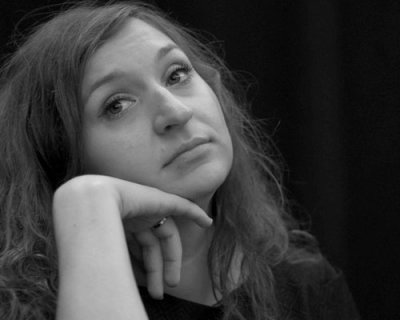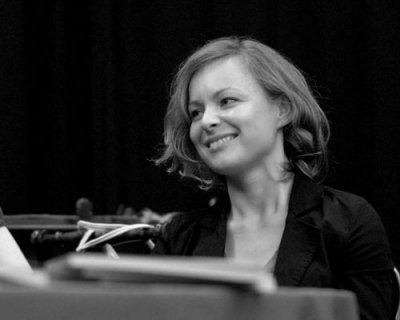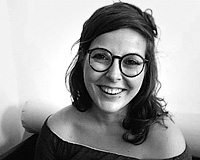What is Cwiszn [Cvishn], or the goals of this subversive project
Why Cvishn?
The Cvishn was founded as a response to the situation of perceptible non-existence of Yiddish and Yiddish culture in Poland where they both used to flourish, however, in almost one-way symbiosis with the surrounding ethnic, linguistic, cultural and historical environment. And by saying Poland here, I do not mean a geographical territory but rather a complex construct that would embrace a physical territory too but also an intangible space of collective Polish memory and awareness with all their social and cultural heritage and present perceptions.
There[1] are two clichés, not to say stereotypes, prevailing about Yiddish culture in Poland, that have had a decisive impact on the shape of its presence, or rather absence in the Polish culture. The first maintains that Yiddish was merely a popular, folk culture of Jewish masses, and those authors, who created works of haute culture, simply assimilated and used respective national languages of the country they lived in as means of their artistic expression. The other argues that Yiddish is a dead language and so is its culture. “Yiddish culture has become a rather noble yet museum exhibit; a butterfly pinned to a mounting board that you go past rather impassively. Its immobilization is striking, the more so when we compare it with the example of the United States, where Yiddish is becoming – at least for some – a tool to define one’s identity, esthetics, politics opposing against to the dominant trends, though the sentimental (to say the least) image of Yiddish as the language of der alter heym [di alte heym, lit. old home] – the Old Country prevails there as well. Similar phenomena, though at a much smaller scale, can be seen in Israel”.
Therefore Cvishn was created as an attempt to change the condition and situation of Yiddish in Poland. The title means “between” or “among” and hence, the magazine is to be placed in an “intermedial space extending between different times and cultures. We want to mediate between the past and present Yiddish cultures, between the cultures before and after Shoah, before and after March of 1968 but also – or primarily – between the Yiddish and Polish cultures. We will have to find very many keys to enable the discussion with Yiddish culture.”
The magazine also intends to bridge the enormous gap between the two cultures. This breach was not created by Holocaust. It had existed for centuries though Poland was one of the largest centers of flourishing Jewish culture, literature, religion and philosophy. The authors believe it is high time to add the other vector to the Polish and Yiddish cultural relations, and change them from unilateral to truly bilateral. In Cvishn, they expect to accomplish it not only by (re)translating pieces of older and modern Yiddish literature but presenting the variety of facets Yiddish culture has, hence, the magazine will have literary, linguistic, and historical chapters. They have also set off to discover some less conventional lands of artistic expression – “all the bordering and transgressive spaces”, and explore “all the possible points of Polish and Yiddish contact, and attempt to reinterpret the Yiddish cultural heritage together with different Polish artists”.
The Cvishn people do not want to create another hermetic literary skansen or secret vault where sacred treasures and scriptures of the past will be buried to be accessible to a few savvies whom the entrance code had been revealed to. Instead, they will be forging, or rather molding, as many keys as needed to give us back the texts that “do not deserve to fall in oblivion, reevaluate overused concepts and modes of interpretation, and finally, examine commonplace perceptions and stereotypes”. This, as they call it, subversion aims at recognition and assimilation of Yiddish culture as part of Polish culture and heritage not only of the past but as a valuable resource that could be used nowadays to open us to multicultural experiences of (post)modern world, and developed into the future to mutually enrich us further. Let the dialogue begin.
[1] This summary is based on the Editor’s comments to the first double issue of Cvishn (2010, nos.1–2), and other texts published in it. Any direct cites will be duly marked as such.
People
 Karolina Szymaniak - a researcher, editor, translator and language instructor with a PhD in literary and cultural studies. Her interests range across modern Yiddish literature, theories of modernism and of the avant-garde, and women's literature. Her doctorate dealt with the problems and discourse of Yiddish literary criticism. She edited a bilingual, Polish-Yiddish, anthology Warszawska awangarda jidysz [Warsaw Yiddish Avant-garde, Gdansk, 2005]. In 2006 her book on the aesthetics of a pre-War Polish-Yiddish writer Debora Vogel was published. Her articles appeared in Polish, English and Belorussian. Currently she is preparing a bilingual anthology of Yiddish poetry by women, in cooperation with Joanna Lisek and Bella Szwarcman and, together with Joanna Nalewajko-Kulikov, a Polish language anthology of Soviet Yiddish literature and culture (planned for 2012). She held various scholarships, granted by, inter alia, the Foundation for Polish Science, the Polish Ministry of Education and The Centre for Studies of the Culture and History of East European Jews of Vilnius University. She lives in Cracow and makes delicious preserves.
Karolina Szymaniak - a researcher, editor, translator and language instructor with a PhD in literary and cultural studies. Her interests range across modern Yiddish literature, theories of modernism and of the avant-garde, and women's literature. Her doctorate dealt with the problems and discourse of Yiddish literary criticism. She edited a bilingual, Polish-Yiddish, anthology Warszawska awangarda jidysz [Warsaw Yiddish Avant-garde, Gdansk, 2005]. In 2006 her book on the aesthetics of a pre-War Polish-Yiddish writer Debora Vogel was published. Her articles appeared in Polish, English and Belorussian. Currently she is preparing a bilingual anthology of Yiddish poetry by women, in cooperation with Joanna Lisek and Bella Szwarcman and, together with Joanna Nalewajko-Kulikov, a Polish language anthology of Soviet Yiddish literature and culture (planned for 2012). She held various scholarships, granted by, inter alia, the Foundation for Polish Science, the Polish Ministry of Education and The Centre for Studies of the Culture and History of East European Jews of Vilnius University. She lives in Cracow and makes delicious preserves.
 Anna Szyba – urodzona w Warszawie w 1981 roku. Absolwentka kulturoznawstwa, współpracowniczka Anki Grupińskiej w projektach „Świadek Żydowskiego Stulecia” oraz „Zapisywanie Żydowskiego Świata w Polsce”, obecnie pracuje nad projektem rozprawy doktorskiej w Instytucie Germanistyki Uniwersytetu Warszawskiego.
Anna Szyba – urodzona w Warszawie w 1981 roku. Absolwentka kulturoznawstwa, współpracowniczka Anki Grupińskiej w projektach „Świadek Żydowskiego Stulecia” oraz „Zapisywanie Żydowskiego Świata w Polsce”, obecnie pracuje nad projektem rozprawy doktorskiej w Instytucie Germanistyki Uniwersytetu Warszawskiego.
 Barbara Klicka - ur. 30 kwietnia 1981 r. W 2000 roku ukazała się jej debiutancka książka poetycka. Współzałożycielka Literackich, prezeska Fundacji 100 Szt., redaktorka kwartalnika "Cwiszn". Jej teksty publikowane były m.in. w Studium, Kursywie, LiteRacjach, Arkadii.
Barbara Klicka - ur. 30 kwietnia 1981 r. W 2000 roku ukazała się jej debiutancka książka poetycka. Współzałożycielka Literackich, prezeska Fundacji 100 Szt., redaktorka kwartalnika "Cwiszn". Jej teksty publikowane były m.in. w Studium, Kursywie, LiteRacjach, Arkadii.

Agata Kondrat - PhD Candidate in German Studies at Warsaw University. Currently writing her dissertation on Polish-Yiddish language contact. Her research concentrates on Polish language and culture’s influence on Yiddish. She has been awarded numerous scholarships and grants from institutions such as The Goldstein-Goren Diaspora Research Center, Vilnius Yiddish Institute, YIVO Institute for Jewish Research While completing her doctorate, she is also a teacher of Yiddish and German in Warsaw.
 Kasia Kazimierowska - Assistant Editor in Cwiszn, editor in Rzeczpospolita journal and Res Publica Nowa quarterly, cooperates with Kultura Liberalna, writes about Warsaw, films, books, in love with Portugal, local patriot in Saska Kepa
Kasia Kazimierowska - Assistant Editor in Cwiszn, editor in Rzeczpospolita journal and Res Publica Nowa quarterly, cooperates with Kultura Liberalna, writes about Warsaw, films, books, in love with Portugal, local patriot in Saska Kepa
 Anna Tenenbaum born in 1989. Graduated from Polish Philology with Cultural Studies in Jagielonian University in Krakow, she is currently working on her Master thesis, finishing the postgraduate course in the Department of Cultural Studies at the University of Warsaw. Since 2005 she's been working for the Joint Distribution Committee Poland, and has recently been appointed the Creative Department Coordinator of RISK made in warsaw, a lifestyle brand where she is responsible for the Jewish line of clothes called risk OY*.
Anna Tenenbaum born in 1989. Graduated from Polish Philology with Cultural Studies in Jagielonian University in Krakow, she is currently working on her Master thesis, finishing the postgraduate course in the Department of Cultural Studies at the University of Warsaw. Since 2005 she's been working for the Joint Distribution Committee Poland, and has recently been appointed the Creative Department Coordinator of RISK made in warsaw, a lifestyle brand where she is responsible for the Jewish line of clothes called risk OY*.






 Dofinansowano ze środków Ministerstwa Kultury i Dziedzictwa Narodowego w ramach
Dofinansowano ze środków Ministerstwa Kultury i Dziedzictwa Narodowego w ramach